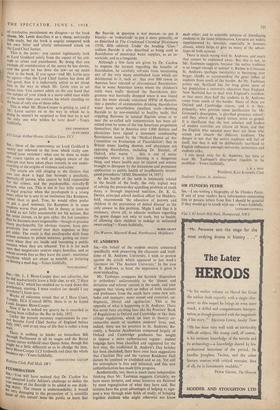ST. ANDREWS
SiR,—On behalf of the student society concerned specifically with preserving the character and tradi- tions of St. Andrews University, I wish to protest against the article which appeared in last week's Spectator on 'The Ancient University.' In the case of St. Andrews, at least, the impression it gives is most misleading.
Mr. Taubman compares the Scottish 'disposition to orthodoxy' unfavourably to the 'dissent and deviation and reform' current in the south, and later suggests that 'along with an influx of both students and professors from the south have come new atti- tudes and manners : more casual- and convivial, utf- dogmatic, liberal and egalitarian.' This is the opposite of what is happening in St. Andrews. There has never been anything here like the Proctors' Book of Regulations in Oxford and Cambridge or like their college regulations, which (at least in theory) cir- cumscribe much of southern students' lives; and, indeed, there are no proctors in St. Andrews. Re- cently, a Senatus Academicus composed largely of Oxford and Cambridge graduates has sought to impose a more authoritarian regime : student lodgings have been classified and registered for the first time, the traditional St. Andrew's Day holiday has been abolished, there have even been suggestions that Charities Day and the various Residence Hall dances be confined or abolished and so on. Yet still the atmosphere is free and informal, and this new authoritarianism has made little progress.
Academically, too, there is much more independent thinking than Mr. Taubman suggests. Certainly, we have many lectures, and some lecturers are flattered by mere regurgitation of what they have said. But lectures have the great advantages of helping to sign- post a way through wide fields of study; of bringing together students who might otherwise not know
each other; and in scientific subjects of introducing students to the latest information. Lectures are widely supplemented by tutorials, especially in honours classes, which helps to give us many of the advan- tages of both systems.
There is much wrong with St. Andrews, and much that cannot be explained away. But this is not, as Mr. Taubman suggests, because the native tradition is no longer enough to sustain' it. Rather is it because St. Andrews (perhaps inevitably) is becoming ever larger, chiefly to accommodate the great influx of students from south of the border. As Mr. Taubman points out, Scotland has for long given more of her population a university education than England. Now Scotland has to deal with England's overflow, so that more than half the students in St. Andrews come from south of the border. Many of these are Oxford and Cambridge rejects, and it is they, primarily, who provide some justification for Mr. Grimond's description, 'a glorified grammar school'; and they, abOve all, regard lecture notes as gospel. It is significant that the best scholars and leaders of student activities are almost all Scots, and that the English who succeed most here are those who accept and absorb the different tradition. The danger is not that the native tradition will fail of itself, but that it will be deliberately sacrificed to English influences amongst university authorities and students alike.
I can speak only for St. Andrews, but here at least Mr. Taubman's description requires to be modified.—Yours faithfully,










































 Previous page
Previous page